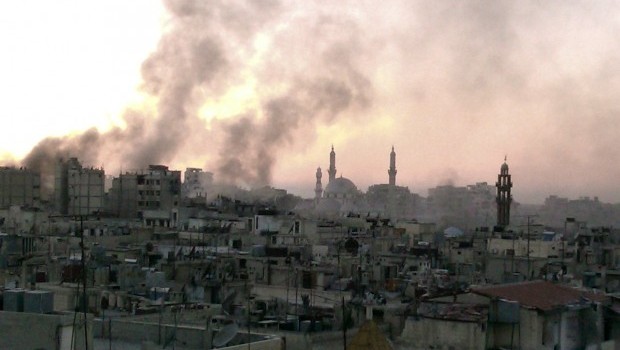
A handout image released by the Syrian opposition’s Shaam News Network on July 9, 2013, allegedly shows smoke rising from buildings in Syria’s central city of Homs following airstrikes by government forces. (AFP Photo/Ho/Shaam News Network)
London, Asharq Al-Awsat—Ghassan Hitto resigned from his position as prime minister of the National Coalition for Syrian Revolutionary and Opposition Forces on Monday, after “failed efforts to form a government due to disagreements within the opposition.”
The decision came less than four months after Hitto was tasked with forming an interim government in opposition-held areas. In a statement posted yesterday on the interim government’s website, Hitto said that “circumstances that have become known to everyone” had prevented him from initiating work on the ground.
He added that his resignation was in the interests of “opposition unity—especially within the National Coalition; [the Coalition’s] participation in leaving a state of political polarization; and allowing the new coalition leadership to carry out its responsibilities, especially in relation to the interim government.”
Ahmad Ramadan, a member of the National Coalition political bureau, told Asharq Al-Awsat that Hitto had been expected to present the results of his recent efforts to form a government to the General Authority, the governing body of the coalition, which planned to thank him and accept his resignation.
Ramadan also said that the General Authority was likely to “appoint another national figure from inside Syria, [who is] linked to the internal conditions and able to respond to the requirements of the next stage.”
The National Coalition underwent further changes to its leadership just two days prior, when Ahmad Jarba was elected as president with a total of 55 votes. The secretary-general of the coalition, Mustafa Al-Sabbagh, obtained 52 votes.
With the siege of Homs entering its tenth day, it is also a crucial time for opposition forces on the ground in Syria. Jarba described the situation in Homs as a “real humanitarian disaster.”
According to opposition activists, “two hundred mortar shells and rockets fell on Khaldiyah within half an hour at dawn yesterday [Monday],” in an attempt by forces loyal to Bashar Al-Assad to take back areas of the city.
A Syrian official told the Associated Press news agency that “government forces control the Khaldiyah neighborhood,” adding that they were continuing to “purge the area of pockets of opposition.”
In contrast, Khalid Bakar, a general coordinator of the military council in Homs, told Asharq Al-Awsat that “Free Army battalions still control neighborhoods in the old city of Homs, especially Khalidiyah.”
Syrian activist Abu Bilal Al-Homsi told the AFP news agency that “regime forces have been able to enter parts of Khaldiyah after heavy shelling,” and that they now control around 30 percent of the neighborhood.
There have also been changes within the Syrian government. On Monday, it was announced that 16 members of the senior leadership of ruling the Ba’ath Party had been replaced, including vice-president Farouk Al-Shara.
With the departure of Shara, an associate of Syria’s previous ruler, Hafez Al-Assad, the upper ranks of the party are now controlled by contemporaries of Bashar Al-Assad, the son of Hafez and the current president.
However, given the tight control exerted on the party and the Syrian government by the Assad family, any change is likely to be only symbolic.
